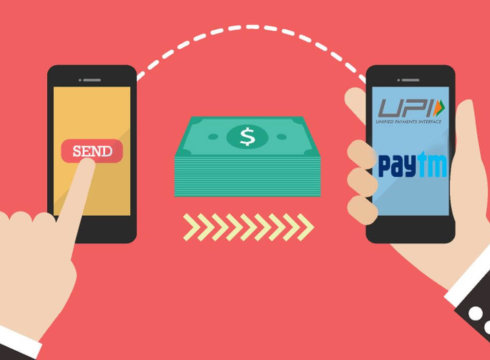SUMMARY
The Move Is Aimed At Enhancing Adoption Of UPI Based Payments Among Consumers
Inc42 Daily Brief
Stay Ahead With Daily News & Analysis on India’s Tech & Startup Economy
As an additional boost to the growing population of the Unified Payments Interface (UPI), Indian banks, both public and private, are gearing up to align their digital payment solutions under the umbrella of BHIM (i.e. Bharat Interface for Money).
Henceforth, BHIM will feature as a prefix to the UPI application of every bank. To that end, the National Payments Corporation of India (NPCI) has already notified banks to display the prefix ‘BHIM” prominently at all major merchant checkout locations.
The move, sources believe, is aimed at further promoting UPI as the one-stop solution for smartphone-based small value retail transactions. According to one banker, this branding experiment is similar to the way merchants advertise payment options for credit and debit card users.
He said, “The UPI front end of the bank apps will be changed to include the name BHIM. Although this will be a nomenclature change. Eventually, everything will become part of the larger BHIM family.”
By adopting BHIM as a prefix to their own digital payment solutions, banks are also looking to eliminate confusion among merchants and consumers over payments using UPI. Furthermore, the move is expected to provide a single, recognisable identity to the plethora of UPI apps being developed by different banks. The goal is to enhance adoption of UPI-driven digital payment applications.
As per one source, banks are also looking to gain access to the promotional campaigns by the government, which until now were available only to BHIM users. He added, “Since there is already a wide-scale promotion campaign being run around Bhim, it has been decided through consensus that all bank apps should be renamed under the aegis of BHIM.”
As part of the rebranding move, bank-led UPI apps will not be renamed as BHIM SBI Pay, BHIM Axis Pay, BHIM RBL Pay and so on.
BHIM App: Clocking 10 Mn Downloads In 10 Days
Launched in December 2016, the BHIM app is essentially a rebranded version of UPI and Unstructured Supplementary Service Data (USSD). Available on the Android app store, the app allows users to send money, receive from friends, family and customers through a mobile number or payment address. For that, one has to register his bank account with BHIM, and set a UPI PIN for the bank account.
In June 2017, the NPCI reportedly crossed the 10 Mn mark in Unified Payments Interface (UPI) transactions. The transaction count was 1 Mn in August 2016. UPI-based BHIM app, played a significant role in reaching this milestone. Since its launch, the BHIM app has been downloaded more than 20 Mn times.
In recent times, both the NPCI and the central government have doubled down on their efforts to boost the popularity of the BHIM app among Indian users. As part of one such initiative, the Government of India has promised more than $78 Mn (INR 500 Cr) in the form of cashback and bonus offers available only on the BHIM app.
The UPI-based app has also received substantial support from the NPCI. Post demonetisation, the NPCI rapidly expanded the app’s reach among merchants and buyers through attractive discounts and cashback.
However, the app’s staggering growth in the last few months has become a source of anxiety for many payment companies in the country. At a NITI Aayog event in August, several prominent entrepreneurs in the payments sector petitioned the government about making the National Payments Corporation of India (NPCI) a neutral body.
The group included Paytm founder Vijay Shekhar Sharma, PhonePe’s Sameer Nigam as well as people from other payment companies like Instamojo and Mswipe.
Commenting on the development, one entrepreneur from the group stated at the time, “We asked that NPCI must not be only owned by banks and that it should ensure there is a level-playing field between banks and other players.”
UPI And BHIM: Steering India Towards Cashless Economy
Poised to reach $500 Bn by 2020 according to a report by Google and Boston Consulting Group, the digital payments segment in India has witnessed a sea change in recent times. As per the report, cashless transactions in the consumer payments segment is expected to double to 40% in the next three years.
Already 81% of existing digital payment users prefer paying online to any other non-cash payment methods. Indian consumers are 90% as likely to use digital payments for both online as well as offline transactions.
As soon as the service was launched, several payment companies came up with their own version of a UPI based mobile app. Among these were Trupay, Razorpay, MobiKwik and Flipkart-owned wallet PhonePay. In March 2017, the RBI also opened up UPI for digital wallets. This allowed users to directly send/receive money via digital wallets like Paytm, Freecharge without routing through the bank.
In the last couple of months, many companies outside the payments space have also embraced the government’s UPI and BHIM technologies. In June, messenger service Hike launched its UPI-enabled digital wallet interface, while global chat service WhatsApp is in the process of getting clearance from NPCI to launch the wallet in partnership with SBI.
In August, Uber India launched UPI integration in partnership with National Payments Corporation of India (NPCI) and banking partners Axis Bank and HDFC Bank. A month later, Google’s much awaited UPI enabled mobile payments app Tez was launched by the Finance Minister Arun Jaitley. Around the same time, Airtel Payments Bank reportedly bolstered its digital platform with the integration of UPI.
While the latest initiative to bring UPI apps under the umbrella of BHIM will likely benefit banks, it could be more of an obstacle for non-banking digital payment apps like the ones mentioned above.
(The development was first reported by ET)
Note: We at Inc42 take our ethics very seriously. More information about it can be found here.


